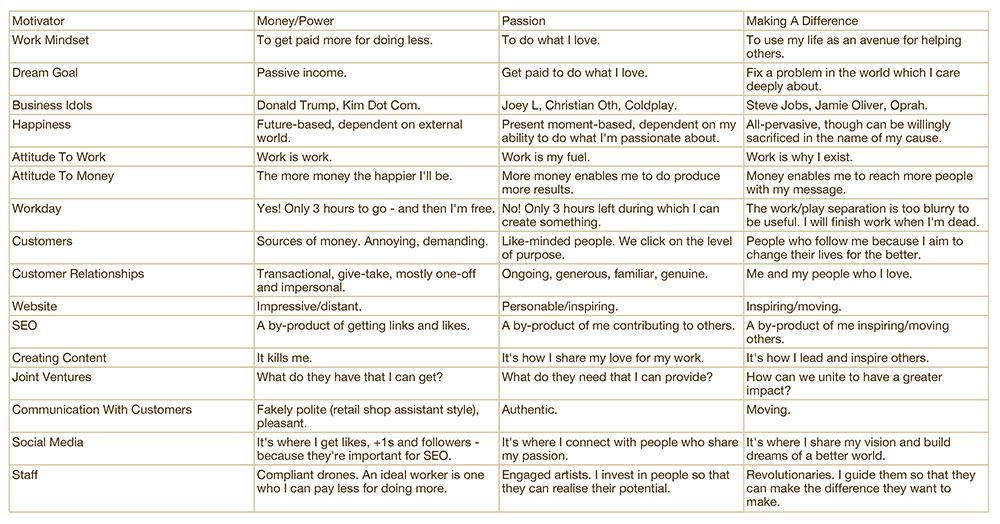by guest contributor Steven McConnell
Yesterday, we discussed some of the changes taking place in the photography industry and important factors to think about when structuring your own business model. Today we’ll take a closer look at the tools and motivators that can help you to become a Pro Photographer and build a stronger business! Come read Part 1 of “Why There’s Never Been A Better Time To Become A Pro Photographer”
The Tools You Need
If you own a photography business and your strategy is not closely enmeshed around the Big 6, chances are, you’re probably going out of business (and you might not know it).
And if you’re a passionate up-and-coming photographer and you leverage the Big 6, you can grab a significant enough market share in your niche for you to be able to make a good living as a photographer.
However!
Am I saying that an Internet-savvy social media whiz-kid who is handy with a DSLR is guaranteed to experience success as a professional photographer? Well, not quite: I’m merely saying that this person will have effective tools at his disposal for building a business, without which he’s otherwise not likely to succeed.
But to leverage those tools, something deeper has to exist – and it has nothing to do with learning business or taking photos.
Limitations Of Our Mind
Your motivations will define the scope of your actions which will, in turn, determine the results you experience. It’s a human phenomenon which can be illustrated like this:

If you’re hungry, you’ll go to the fridge, grab a snack and experience fullness. Basic stuff, right?
Thing is, this paradigm applies in starting a photography business as much as it does in getting a snack.
But the mistake we often make in business is that we approach this paradigm in reverse. In our rush to create results – “I want to quit my day job and work full-time as a photographer!” we begin to take necessary actions – “I’m building a website and creating a portfolio” – and we often forget to examine the motives for our actions altogether.
In doing so, we set ourselves up for failure because it is our motivations that determine how we perceive business problems and which opportunities become visible to us. Which, in turn, shapes our responses to these problems and opportunities and yields different results.
Your World Is Not Real
I think that, broadly, people who are starting a business are driven by one of 3 motivations. One of them sets you up for likely failure in modern-day business. The other two for likely success.
Let’s say there are 3 guys/gals starting off as photographers. And let’s say they all have the same resources at their disposal. They also have about the same level of skill as photographers and about the same amount of knowledge about business.
Now, these 3 guys/gals will build completely different 3 businesses, depending on whether they’re motivated by a desire to make money, to do what they love or to make a difference in the world – because despite existing in the same external physical reality, they all distinctly different internal experiences of that reality.
Effectively, they live in 3 different worlds. And in each of those worlds, they have a very different relationship with their businesses and, correspondingly, they experience a different amount of power in their ability to create what they want.
Below is a chart which examines how these 3 motivators might shape our everyday attitudes to business-related thought processes and business operations:
Click HERE to see a larger version of the chart above
Now, these are not absolute definitions – please use them loosely. I didn’t put this list together to put rigid labels on people, but to illustrate the shift in perception which takes place – and the opportunities which become visible – when an individual’s consciousness rises and they become driven by more empowering motives.
Imagine That You Are A Millionaire
I hope the table above illustrates that you need a game that’s greater than a desire to make lots of cash to succeed as a professional photographer.
So, what drives you?
Be ruthlessly honest with yourself in examining your motivations for wanting to become a photographer. And the best way I know of doing it by asking yourself:
“If I won $100 million tomorrow – so that my financial needs are taken care of forever – what would I spend the rest of my life doing?”
Sure, you’d spend a few months spoiling yourself, travelling, buying toys, eating everything in sight and having a good time. But then what? What do you want your life to be about?
Take your time with this one. Ponder on it for a few days if you have to.
The answer will shine a light on your deepest motivations in your life, right now. And I say “right now” to point out that they might change – and they often do – in the future.
If you come to the conclusion that if you were a millionaire, you’d continue spending your wealth to make yourself happy (it also includes closely related extrinsic motivations, like looking cool, being impressive, liked and important, sticking it to the boss, having the latest gadgets and fashion, etc) it’s perfectly OK. But I’d suggest that it’s best to leave this whole business-building idea aside for now.
However, if one thing emerges as “the” interest or cause you’ve been wanting to pursue all your life, but haven’t had enough time/money to – and if that interest/cause happens to be around your love for photography or your love for other people, then this could be the beginning of something beautiful.

Why Online Is Important
Am I saying that, unless you’re driven by a desire to pursue your passion or cause a revolution, you won’t succeed?
Yes.
Yes, if you want to be a photographer, that is.
There are still industries (like construction/development, for example) where smart people with the right connections and an ambition to get rich can still achieve their goals.
Largely because those industries are, by their nature, further away from the Big 6 than photography – and still haven’t been transformed and revolutionised by the digital age to the same extent. But even for them it’s just a matter of time.
Photography, on the other hand, through its contemporary digital nature, has saddled up cosily next to the Big 6 to the point where it’s been profoundly influenced and transformed by them.
Your future customers will research you online and they’ll shop for you through a combination of organic search, editorial articles and recommendations from people in their social media feeds.
It’s extremely likely that the photography you’ll produce will be created and edited in digital form and your customers will expect to consume it through the mature, extremely popular digital distribution channels which are now part of their everyday lives.
Why Should You Care?
Because something big happened among the Big 6 in the last few years.
Unless you’ve been on the Moon (or in the construction/development industry, perhaps) you noticed tremors, upsets (Panda, Penguin, EMD updates) in the world of organic search.
Which means you also know that search results are now influenced less and less by relatively easy-to-follow rules (“let’s pay someone to build 1000 links, dude – and hire someone to fix our on-page SEO!”) and more and more by hard-to-manipulate social indicators from industry websites with strong editorial management.
You’re seeing that website copy has also changed – they’re not so much about showcasing goods, but about engaging the artists in dialogue with their audiences.
And you’re also reading that it’s imperative for you to be on social media – as you’re noticing that people are increasingly flicking through their photo albums on iPads and you wonder why everyone is suddenly talking about being in the cloud.
These Changes Are Not Accidental
Nor are they independent of one another.
It’s crucial to realise that they’re surface symptoms of a deeper shift which is happening in the digital online world.
In the past 2-3 years, the consciousness of the Big 6 has shifted from a place where they’ve served mainly those with a need to make money to those who are driven by contribution, passion and a desire to make a difference.
To put it another way – the Internet is increasingly becoming an arid, hostile place to people whose businesses are built around the idea that money buys happiness and which sell goods and services which they don’t intrinsically care about.
And it’s becoming increasingly friendly to artists who are driven by a desire to create something which they deeply care about and share it with the world, all while making a living.
Compare To Yesterday
Think back to the way the Internet looked 5 years ago to today. You saw it, right?
You saw the squeeze pages, five-page long websites, an ocean of info-products pitched by long, scrolling, cheesy sales letters, self-proclaimed experts with fictional testimonials and businesses desperately trying to look bigger than they actually were.
The language was different, too.
There was little talk about sharing, creating relevant content, making a difference to others in your niche and having genuine conversations with your customers. But there was plenty of talk about building and drip-feeding your lists, grabbing attention of traffic, building sales funnels and generating passive income.
Fast forward to today, that still happens. But nowhere near as much.
Our language gives clues to how we perceive things, so if someone talks about “drip feeding” their leads through an autoresponder after squeezing them into a list, how do you think they view those customers? Do they care about anything except themselves? What kind of relationship do you think they’ll have with people they ostensibly serve?
And, most importantly in the context of today’s discussion, will the Big 6 permit that today? Perhaps. But what about tomorrow?
The Big 6 have began the process of stacking the cards to favour the underdogs – the passionate artists, the people who are not counting the pennies, who don’t have a massive budget, who are driven by a reward bigger than money, who are willing to contribute freely and know the pleasure of making a difference.
How long will the shift take to come into full effect? Perhaps a few more years. But the question is – where do you want to be when it happens? And are you going to be ready for it?
Don’t Believe Me?
Take SEO, for example. A business owner who dreams of passive income views SEO as a royal pain in the butt – and a necessary overhead.
He has to get links, he has to create content and he has to get “likes”. It’s a nightmare which he is probably thinking about outsourcing.
And a few years ago, that’s exactly what he’d do. Which meant business owners with money could pay for a lot of link building, get to the top of search results and stay there. And create a ton of SPAM in the process.
These days all those links don’t count for anything. Today, a dozen well-written guest posts on reputable photography blogs (with links to your site) will have you ranking on first page of Google for most long-tail keywords.
And if you’re passionate about photography that’s not a nightmare, but a rewarding way to pass the time, exchange ideas, discuss things and meet like-minded people. It’s just a natural extension of your passion.
Do it regularly for 3-6 months and you’ll have a steady trickle of relevant traffic to your website. In 1 year, you’ll be a significant player in your chosen photography niche.
I’m Not Talking Theory
I’m sharing my real-life experiences with you. My family photography business was ranking on top of search results for “family photography sydney” in about 3 months. It’s a low-volume, low-competition keyword.
If you’re ranking for 6-8 keywords like that and people who end up on your website are calling you because the photography you create stands out, you have a little business which can support your living expenses. And that’s a start!
When my fiancee quit her corporate job to start a resume writing and interview coaching business, she did the same thing to dominate that niche in 6 months (which, by the way, has more stiff competition than the photography industry).
My point is this: SEO has almost become an almost automatic by-product of passion and a desire to contribute to someone else.
Before an SEO professional slams me for saying that, let me clarify: I’m not saying that simply creating great content on your website is enough – you still need a thought-through SEO strategy which combines on-page and off-page activity and hopefully input from an SEO expert.
The point I want you to take away here is this: if you’re thinking about “getting traffic” then SEO will seem like a daunting task. But if you begin to think about taking care of needs of others through doing work you love, SEO opportunities will begin to present themselves.
And That’s Great News For You
Do you have a skill, a talent, an idea or knowledge which can make a difference to someone else? It means you have the capacity to create value.
Find a group of people who you can offer value to and you’re planting a seed of your business.
Value is a fundamental concept on which all successful businesses are built. Without an ability and a history of creating value you don’t have a business. And your business income will be directly proportional to the amount of value you create.
And the curious Catch-22 is: trying to make money creates little value, but doing something truly creative and sharing it with like-minded people increasingly does. And making a difference to someone in your community creates infinitely more.
Success Of The Future
It would be irresponsible of me to leave you with an idea that starting a successful photography business is as simple as taking some nice photos and sharing them on Facebook.
You need much more than that: as I’ve pointed out, it’s essential to have the right mindset which is backed up by business acumen which is useful in today’s digital world.
The good news is that, if you’ve read this far, you probably have the mindset. You probably love photography and wish you could do more of it.
The other good news is that you also have free access to the latter – the shift in consciousness on the Internet which I’ve mentioned is driving a creation of extremely valuable business knowledge which is free (or very cheap) for you to access.
Which means the only thing that’s required from you is action. All the mindsets, insights, ideas and knowledge in the world are useless unless they’re being used to create something.
Don’t fall in the trap of becoming a knowledge junkie and feel like you have to endlessly learn before you start your business.
The only question left is – when are you going to start taking action to transform your passion for photography into a full-time job?
The only question left is – when are you going to start taking action to transform your passion for photography into a full-time job?
![]()
 About the Author: Steven McConnell is a family portrait photographer based in Sydney.
About the Author: Steven McConnell is a family portrait photographer based in Sydney.
Hey! I’m a big believer that a successful photography business begins with an empowering mindset. True, it’s important to be a savvy businessperson and a great photographer, but if your head space is not in a place which empowers you, no clever business ideas and amazing photos are going to carry the day. I find this a fascinating idea to explore because it helps illuminate the reasons behind our successes and failures and offers direct access to a fulfilling, profitable and meaningful job as a professional photographer.
Visit Steven at his WEBSITE | GOOGLE+










Great article. Very helpful as I contemplate starting a photography business in the next year or two.